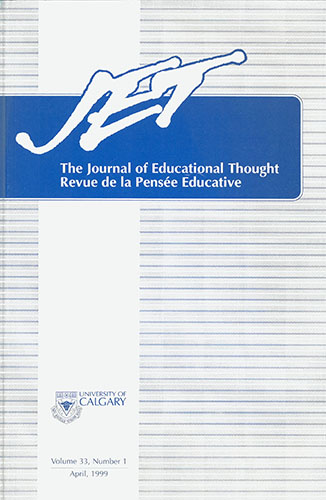Indigenous Research Methodology: Exploratory Discussion of an Elusive Subject
DOI :
https://doi.org/10.55016/ojs/jet.v33i1.52552Résumé
The possibility of a defined Indigenous Research Methodology is exciting to indigenous and non-indigenous scholars alike, though probably for different reasons. Present assumptions suggest that such a methodology would determine standards for authenticity of indigenous research, and would enable a more effective critique of research dealing explicitly with indigenous reality. The question of who should participate in the development of an indigenous research methodology is critical since every scholar who has any connection with indigenous research topics or indigenous people will feel directly impacted. Responses to the question will indicate the form or quality of interactions between indigenous and non-indigenous scholars grappling with the political, social, and personal issues that assuredly will arise in any discourse of an indigenous research methodology. Such a concept might be perceived as a threat to existing forms or models of knowledge and knowledge creation. While indigenous scholars must be aware of such reactions, they will nonetheless experience themselves as the "active-centre" in the process of any indigenous research which they choose to live through. They are a piece of the heart in the body of growing indigenous knowledge. Indigenous research methodology is and has always been the central structure of support for the creation of indigenous knowledge. There are some principles which underlay most indigenous research - where this is understood to mean research conducted by indigenous people. Moving however to a discourse which includes indigenous and non-indigenous participants in an academic focus on indigenous research methodology might profitaby include a consideration of such principles as (a) the interconnectedness of all living things, (b) the impact of motives and intentions on person and community, (c) the foundation of research as lived indigenous experience, (d) the groundedness of theories in indigenous epistemology, (e) the transformative nature of research, (f) the sacredness and responsibility of maintaining personal and community integrity, and (g) the recognition of languages and cultures as living processes.
Téléchargements
Téléchargements
Publié-e
Numéro
Rubrique
Licence
The Journal of Educational Thought retains first publication rights for all articles. The Journal grants reproduction rights for noncommercial educational purposes with the provision that full acknowledgement of the work’s source be noted on each copy. The Journal will redirect to the appropriate authors any inquiries for further commercial publication of individual articles. All authors wishing to publish in JET will be asked to fill in and sign a Consent to Publish and Transfer of Copyright agreement.
Authors must affirm that any submission to JET has not been and will not be published or submitted elsewhere while under considration by JET.

